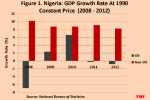The Economic Commission for Africa (ECA) will continue to support Member States in their quest for sustainable development that promotes inclusive prosperity, economic opportunity and greater social well-being, ECA official said.
Speaking at the beginning of a two-day National Policy Dialogue on Job Creation in Nigeria, Sylvain Boko, Principal Regional Advisor on Planning and Statistics in the ECA’s Capacity Development Division, stressed that the ECA had the mandate to promote socio-economic well-being on the continent.
“One of the ways we do this is to work directly with individual Member States to help think through their policy choices and development priorities consistent with their national aspirations,” he told the high-level meeting participants.
“In this respect, ECA puts a premium on strengthening its relationship and partnership with Nigeria, and the support that it has provided to this National Policy Dialogue on Job Creation is just one manifestation of this interest.”
Mr. Boko thanked Mr. Adeyemi Dipeolu, the Special Advisor to the President of Nigeria on Economic Matters, for inviting the ECA to be part of the dialogue to discuss Nigeria’s job creation policies as the country works to improve people’s well-being through job creation initiatives, targeting the youth in particular.
“Job creation, especially for young people, is very important. The ECA will continue to work with Member States to ensure we have partnerships and proactive efforts that can help promote job creation or create a sufficient number of jobs as we seek to address employment needs for our youth on the continent,” he added.
The dialogue was necessitated by Nigeria’s jobless growth over the period 2000 – 2015. The growth was on the back of strong global commodity prices, especially the oil export boom.
The Nigerian government says it recognizes this strong growth experience continued to be accompanied by several challenges, the most critical being unemployment.
“It is now well established that economic growth needs to be inclusive, if it is to improve human welfare and ensure increasing social and political stability,” reads the concept note for the dialogue.
“One important means through which growth can be inclusive is by creating jobs. This derives from the reality that the benefits of economic growth reach most people through employment income. Therefore, the challenge of economic management is to ensure that economic growth translates into stable wage-paying jobs that are the key to the continued expansion of the nation’s aggregate consumption, savings and investment.”
The main purpose of the policy dialogue was to conduct a comprehensive analysis of Nigeria’s employment landscape and come up with ways to significantly increase the number of new jobs in the country in the next five years.
Participants discussed the framework for generating a deeper understanding of Nigeria’s unemployment challenge in terms of its magnitude, dimensions and the key determining factors and proposed various steps to address the unemployment challenge.
These include, a comprehensive analysis of Nigeria’s previous and existing job creation policies and programmes in terms of their focus, objectives, implementation and impact.
They also reviewed lessons from other countries’ experiences; analyzed the potential job creation opportunities of the Nigerian economy now and into the future, based primarily on the existing structure of the economy and its projected evolution over the next 25 years.
Participants also identified and analysed the range of barriers to creating jobs that must be tackled in the country; and also deliberated on the development of an appropriate job creation strategy whose effective implementation should produce a convergence between the growth rates of Nigeria’s labour force and that of net job creation, at an acceptable unemployment rate.
Nigeria’s Board of Economists, under the aegis of the Economic Adviser to the President, hosted the meeting in Ibadan last week in conjunction with the Economic Commission for Africa.

